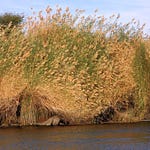We’re in the last week of Librivox Magic. If you don’t know what that is, well, all this month, we’ve been digging into the LibriVox archive of African folktales.
This week, we’re going to hear three stories that feature plants!
“How Mushrooms First Grew” is a delightful chain tale from the Ashanti people of Ghana. (Source: West African Folktales by William Henry Barker).
“The Crimson-striped Lily” is from the Ganda people of Uganda. (Source: The King of the Snakes and Other Folklore Stories from Uganda by Rosetta Baskerville).
“Why The Plantain Stalk Bears But One Bunch” is from the Mpongwe people of Gabon. (Source: Where Animals Talk: West African Folklore Tales by Robert Hamill Nassau).
If you know anything about African folktales with non-human characters, you know they can be mindbogglingly fascinating and utterly silly but also, they demonstrate just how keenly observant people were of the natural world, and how they used that knowledge to craft stories which preserved valuable information but also said something about the human condition.
Two of these stories are “explanatory folktales” which propose explanations for why things are one way or another. Now these reasons are not exactly Carl Linneaus approved but that shouldn’t take away from the enjoyment of the stories. I find, often, that us modern humans, sitting on centuries of scientific knowledge (and this is not a bad thing), can be a bit dismissive of these kinds of stories. But the interesting thing is that the people who crafted these stories had a scientific knowledge which, in my opinion, spread wide more than it dug deep. So, they may not have known that mushrooms are fungi and produce spores, but they could probably name every kind of mushroom in their local area, tell you when in the year each kind shows up, and advise whether or not they are edible… you know the important things!
Interested in an MA discussion about the intersection of science and folklore? Go here.
You might also like this thread with some suggestions on how to read Mythology and Folklore.
All that being said, a quick notice that MA is going on a much needed break for the month of March. There will be no podcast episodes during this time and I will not be posting updates of any kind. When we return, we will be taking a look at music in African folklore!
Cheers!














Share this post